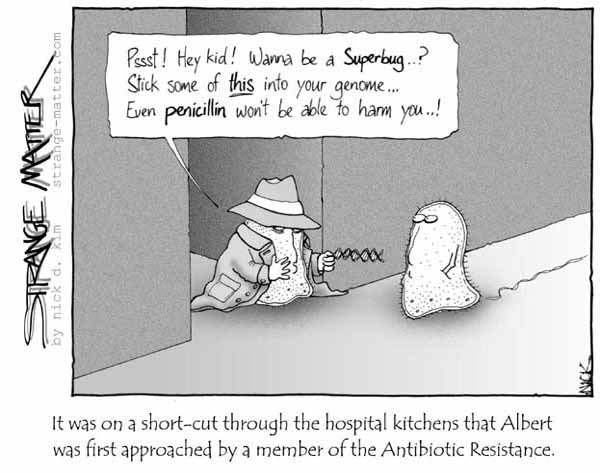Antibiotic resistance is a huge problem. More and more resistant strains of microbes are appearing. Needless to state that this has a huge human and economic cost. Combining this with the increasing globalization, the threat of a global outbreak of an infection caused by a multidrug-resistant bacterium looms over our heads as Damocles’ sword. This perhaps sounds too ominous, but it speaks for itself that research into the development of antibiotic resistance could prove very useful.
To explore this problem, a group of scientists gathered in Cold Spring Harbor, NY at the Banbury Conference Centre to address the issues involved and identify key steps in dealing with this threat. Seven actions that urgently need to be undertaken were identified:
- Public education: it’s important to ensure that the general public understands the important facts concerning antibiotic resistance. This preferably at all levels of the population. In the words of the authors:
Total commitment at all levels of the population is the only solution.
- Public health, sanitation and quality of life: an increase in these three factors can certainly aid in the prevention of the rise of new infections. To quote the article:
Local governments must be encouraged and supported to invest in better sanitation infrastructure and tighter prescription regulations to control the rapid evolution of resistance. This is a worldwide, multinational problem and must be treated as such.
- New antibiotics: new structural classes of antibiotics should be developed, with additional efforts to make these evade known resistance mechanisms. They say:
Public–private partnerships taking new antibiotic development forward should be encouraged, particularly for treatment of infections in economically disadvantaged parts of the world.
- Old antibiotics: old antibiotics should not be mindlessly discarded, but researched for potential new uses. As the authors write:
Start-up companies could use this opportunity to generate effective new antibiotic combinations.
- Control of antibiotic use: the use of antibiotics for anything but therapeutic use should be halted. In the researchers’ words:
A total restriction must be enforced on both compounds that are approved for use in humans and the structural derivatives of these compounds that are used as routine feedstocks in animal feed, agriculture and fisheries.
- Alternatives to antibiotics: non-antibiotic approaches to dealing with infectious diseases should be actively researched and encouraged, such as anti-bacterial vaccines, probiotics, and increased knowledge of the human microbiome and social interactions between bacteria. The authors state:
Such advances may well lead to the use of bacteria and their products as specific therapeutics.
- A collaborative approach: from the discovery of new natural compounds to the large-scale production and distribution of medication, a thorough collaboration between all those involved is recommendable. They note:
Without such collaboration, the antibiotic-discovery commitment becomes the responsibility of government agencies, academia and small biotechnology companies, entailing substantial federal investments.
Overall, the authors conclude:
The cost of the undertaking that we propose will be infinitesimally small in comparison to the economic and human cost of doing nothing. The late Joshua Lederberg observed: “barring geno-suicide, human domination is challenged only by pathogenic microbes, for which we are the prey, they are the predators. In natural evolutionary competition there is no guarantee that we will find ourselves the survivors.” The Banbury participants believe that if the appropriate actions are taken on a worldwide scale, the odds can be changed.

(Source: Strange Matter, Credit: Nick D. Kim)
Reference
Bush, K.; Courvalin, P.; Dantas, G.; Davies, J.; Eisenstein, B.; Huovinen, P.; Jacoby, G.A.; Kishony, R.; Kreiswirth, B.N.; Kutter, E.; Lerner, S.A.; Levy, S.; Lewis, K.; Lomovskaya, O.; Miller, J.H.; Mobashery, S.; Piddock, L.J.V.; Projan, S.; Thomas, C.M.; Tomasz, A.; Tulkens, P.M.; Walsh, T.R.; Watson, J.D.; Witkowski, J.; Witte, W.; Wright, G.; Yeh, P. and Zgurskaya, H.I. (2011). Tackling Antibiotic Resistance. Nature Reviews Microbiology. Published online 2 November. doi:10.1038/nrmicro2693.





Comments